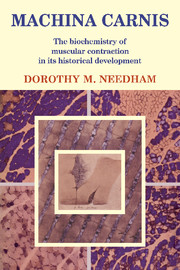Book contents
- Frontmatter
- Contents
- Preface
- Acknowledgments
- List of abbreviations
- 1 Bringing muscles into focus; the first two millennia
- 2 Muscle metabolism after the Chemical Revolution; lactic acid takes the stage
- 3 The relationship between mechanical events, heat production and metabolism; studies between 1840 and 1930
- 4 The influence of brewing science on the study of muscle glycolysis; adenylic acid and the ammonia controversy
- 5 The discovery of phosphagen and adenosinetriphosphate; contraction without lactic acid
- 6 Adenosinetriphosphate as fuel and as phosphate-carrier
- 7 Early studies of muscle structure and theories of contraction, 1870–1939
- 8 Interaction of actomyosin and ATP
- 9 Some theories of contraction mechanism, 1939 to 1956
- 10 On myosin, actin and tropomyosin
- 11 The sliding mechanism
- 12 How does the sliding mechanism work?
- 13 Excitation, excitation-contraction coupling and relaxation
- 14 Happenings in intact muscle: the challenge of adenosinetriphosphate breakdown
- 15 Rigor and the chemical changes responsible for its onset
- 16 Respiration
- 17 Oxidative phosphorylation
- 18 The regulation of carbohydrate metabolism for energy supply to the muscle machine
- 19 A comparative study of the striated muscle of vertebrates
- 20 Enzymic and other effects of denervation, cross-innervation and repeated stimulation
- 21 Some aspects of muscle disease
- 22 Contraction in muscles of invertebrates
- 23 Vertebrate smooth muscle
- 24 Energy provision and contractile proteins in non-muscular functions
- The perspective surveyed
- References
- Author index
- Subject index
20 - Enzymic and other effects of denervation, cross-innervation and repeated stimulation
Published online by Cambridge University Press: 04 August 2010
- Frontmatter
- Contents
- Preface
- Acknowledgments
- List of abbreviations
- 1 Bringing muscles into focus; the first two millennia
- 2 Muscle metabolism after the Chemical Revolution; lactic acid takes the stage
- 3 The relationship between mechanical events, heat production and metabolism; studies between 1840 and 1930
- 4 The influence of brewing science on the study of muscle glycolysis; adenylic acid and the ammonia controversy
- 5 The discovery of phosphagen and adenosinetriphosphate; contraction without lactic acid
- 6 Adenosinetriphosphate as fuel and as phosphate-carrier
- 7 Early studies of muscle structure and theories of contraction, 1870–1939
- 8 Interaction of actomyosin and ATP
- 9 Some theories of contraction mechanism, 1939 to 1956
- 10 On myosin, actin and tropomyosin
- 11 The sliding mechanism
- 12 How does the sliding mechanism work?
- 13 Excitation, excitation-contraction coupling and relaxation
- 14 Happenings in intact muscle: the challenge of adenosinetriphosphate breakdown
- 15 Rigor and the chemical changes responsible for its onset
- 16 Respiration
- 17 Oxidative phosphorylation
- 18 The regulation of carbohydrate metabolism for energy supply to the muscle machine
- 19 A comparative study of the striated muscle of vertebrates
- 20 Enzymic and other effects of denervation, cross-innervation and repeated stimulation
- 21 Some aspects of muscle disease
- 22 Contraction in muscles of invertebrates
- 23 Vertebrate smooth muscle
- 24 Energy provision and contractile proteins in non-muscular functions
- The perspective surveyed
- References
- Author index
- Subject index
Summary
The effects of severance of the nerve to a muscle, whether accidentally in man or in experiments in animals, are striking enough. Besides the loss of power to move, except upon electrical stimulation, a state of atrophy with gradual wasting away of the fibres ensues. About the middle of last century there was much discussion about the need for special trophic nerves. S. Mayer (1) in Hermann's ‘Handbuch der Physiologie’ of 1879 considered this question at length and concluded that there was no proof of the existence of trophic nerves, but that in special cases (e.g. muscle and glands) the nerve supply was concerned in a trophic process of a special nature. Michael Foster (2) also, writing at this same time, was of the opinion that much of the effect of loss of nerve supply could be explained by absence of the usual functional activity. Nevertheless he expressed the view that ‘some more or less direct influence of the nervous system on metabolic actions, and so on nutrition, will be established by future inquiries.’ Langley (1, 2) some forty years later specifically studied the part played by lack of movement in atrophy after nerve section and found that neither passive movement nor active movement caused by electrical stimulation was effective in delaying atrophy. He emphasised however that denervated muscle may be in constant fibrillation, so that it remained possible that the atrophy was caused by fatigue.
- Type
- Chapter
- Information
- Machina CarnisThe Biochemistry of Muscular Contraction in its Historical Development, pp. 484 - 498Publisher: Cambridge University PressPrint publication year: 1971



